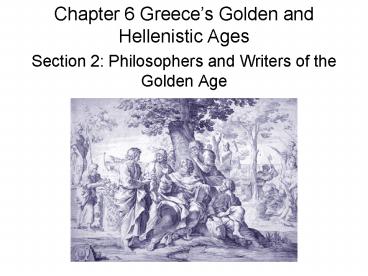Chapter 6 Greeces Golden and Hellenistic Ages - PowerPoint PPT Presentation
1 / 21
Title:
Chapter 6 Greeces Golden and Hellenistic Ages
Description:
As Greece entered its golden age, philosophers (lovers of ... often punished for displaying hubris. B. Tragedies. Sophocles, author of Oedipus Rex, defended ... – PowerPoint PPT presentation
Number of Views:59
Avg rating:3.0/5.0
Title: Chapter 6 Greeces Golden and Hellenistic Ages
1
Chapter 6 Greeces Golden and Hellenistic Ages
- Section 2 Philosophers and Writers of the Golden
Age
2
Section 2 Philosophers and Writers of the Golden
Age
- As Greece entered its golden age, philosophers
(lovers of wisdom) and writers began to think
about the nature of the universe and of human
life. While the Greeks still honored the old
gods, they took pride in human accomplishments.
As the playwright Sophocles wrote, Many are the
wonders, none is more wonderful than what is
man. One of the Greeks greatest achievements
was philosophy, the study of basic questions of
reality and human existence. Philosophers
believed the world is based on natural laws, or
truths, which can be discovered through reason.
3
I. Rise of Philosophy
- The first philosopher, Thales of Miletus,
- attempted to understand the nature of the
- physical universe - cosmology
Thales of Miletus (c. 635 BC-543 BC) also known
as Thales the Milesian, was a pre-Socratic Greek
Philosopher and one of the Seven Sages of Greece.
Many regard him as the first philosopher in the
Greek tradition as well as the father of science.
4
A. Socrates
- To Socrates, education was the key to
- personal growth. His Socratic Method taught
- students to learn through questioning
Socrates (c. 470 - 399 BC "The unexamined life
is not worth living."
5
A. Socrates
- Accused of denying the existence of the gods
- and corrupting Athenian youth, Socrates was
- found guilty and executed
Death ofSocrates by Jacques-Louis David (French,
1748-1825)
6
B. Plato
- Plato was a student of Socrates and founded
- the Academy for teaching philosophy
Plato (427-347 BCE) believed that humans could
not reach perfection
7
B. Plato
- Plato believed all things were imperfect
- expressions of perfect universal forms, and
- that humans consisted of the body and the soul
8
C. Aristotle
- Aristotle, Platos student, founded his own
- school and taught that knowledge could only
- be gained through logical study
Aristotle (384-322 BCE) founded his own school -
the Lyceum
9
C. Aristotle
- Aristotle collected facts and organized them
- into systems, establishing the foundations for
- anatomy, botany, and zoology
Aristotle's Scheme of Matter
10
II. Mathematics, Medicine, and Science
- Greeks explained the world in terms of natural
- laws that could be observed and defined
11
II. Mathematics, Medicine, and Science
- Pythagoras believed that everything could be
- explained in terms of mathematics
12
II. Mathematics, Medicine, and Science
- Hippocrates trained doctors to base treatment
- on observation, experiment, and experience
Hippocrates c.460 BC - 377 BC
13
II. Mathematics, Medicine, and Science
- He taught that disease comes from natural
- causes, not as punishment from gods, and
- advocated rest, fresh air, and a proper diet
As to diseases make a habit of two things - to
help, or at least, to do no harm. Walking is
man's best medicine. There are in fact two
things, science and opinion the former begets
knowledge, the latter ignorance. Healing is a
matter of time, but it is sometimes also a matter
of opportunity. Prayer indeed is good, but while
calling on the gods a man should himself lend a
hand. A wise man should consider that health is
the greatest of human blessings, and learn how by
his own thought to derive benefit from his
illnesses.
14
II. Mathematics, Medicine, and Science
- Herodotus, the Father of History, was the first
- known historian of the Western world
Herodotus (484 BC-ca. 425 BC) the Father of
History
15
II. Mathematics, Medicine, and Science
- Thucydides believed that studying the past
- helps us understand human nature
Thucydides (460 - 404 BC) wrote the History of
the Peloponnesian War
16
III. Greek Theater
- Greek writers produced great works of
- literature and developed many literary styles in
- use today
The ancient theatres were open spaced. One of the
better-preserved theaters is the one located in
ancient Epidauros. The theatre is famous for its
acoustics it is known that even the viewers
sitting in the higher seats and who are far away
from the orchestra can hear the words of the
performers. The seats are made of marble.
17
A. Drama
- Athenian writers were the first to write
- dramas - plays containing action, dialogue and
- involving conflict and emotion
Greek Chorus
18
B. Tragedies
- Tragedies involved fierce conflict with powerful
- divine and human characters. Heroes were
- often punished for displaying hubris
19
B. Tragedies
- Sophocles, author of Oedipus Rex, defended
- traditional Greek values
Sophocles 496-406 B.C.E.
20
B. Tragedies
- Euripides questioned many old beliefs and
- ideas
Euripides c. 480 406 BC While earlier writers
often honored war for its deeds of courage and
heroism, Euripides showed the pain and misery of
war in The Trojan Women
21
C. Comedies
- Aristophanes poked fun at Socrates and used
- comedy to make Athenians think about the
- causes and effects of war
Aristophanes c. 448 BC-380 BC































